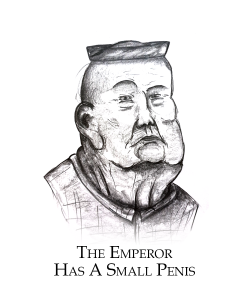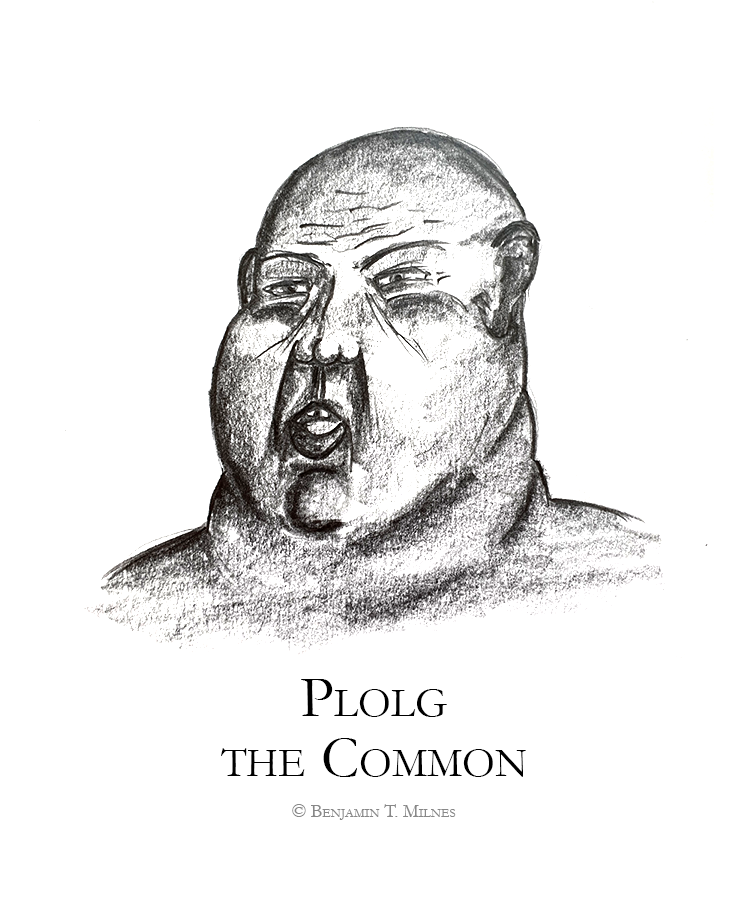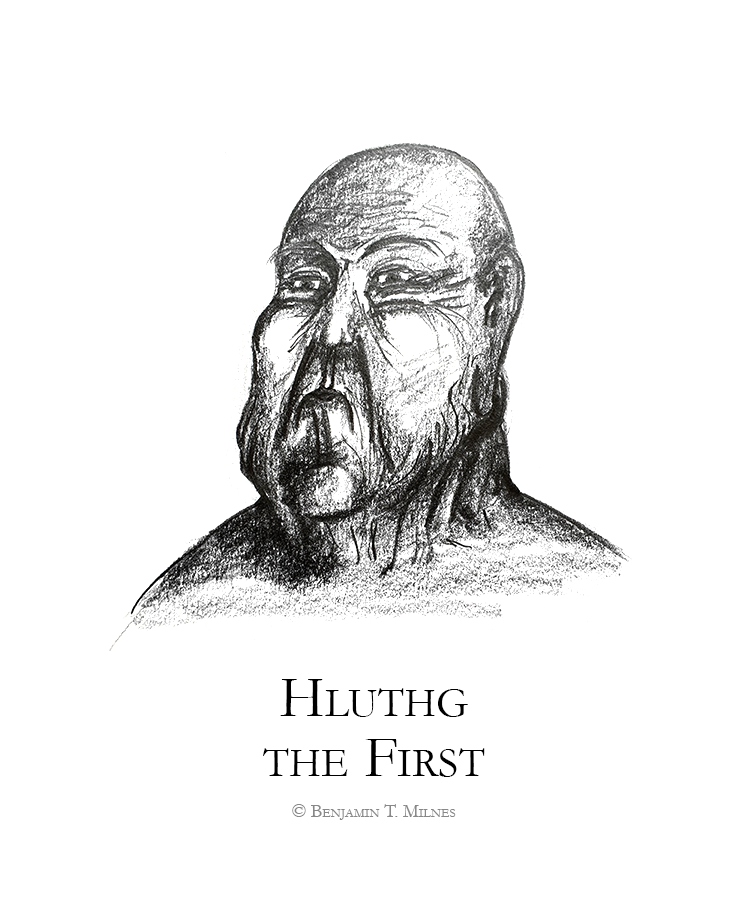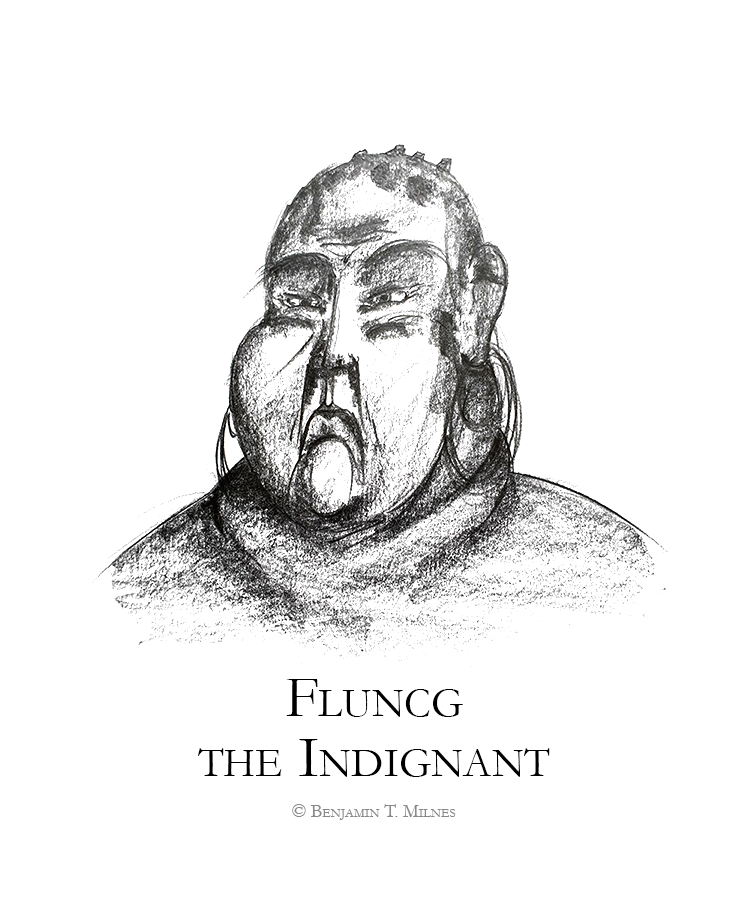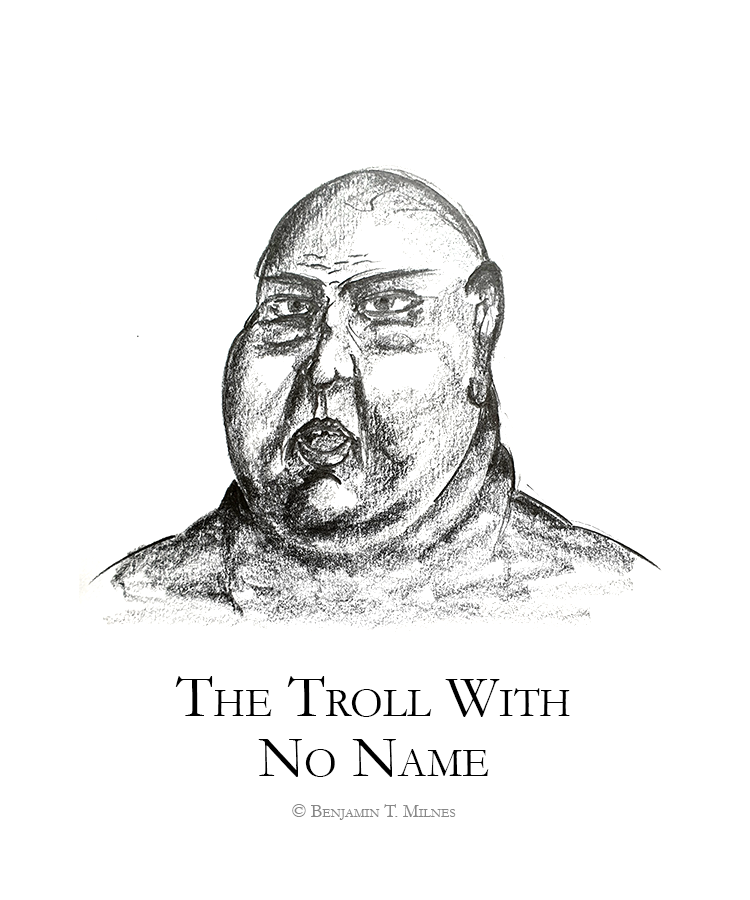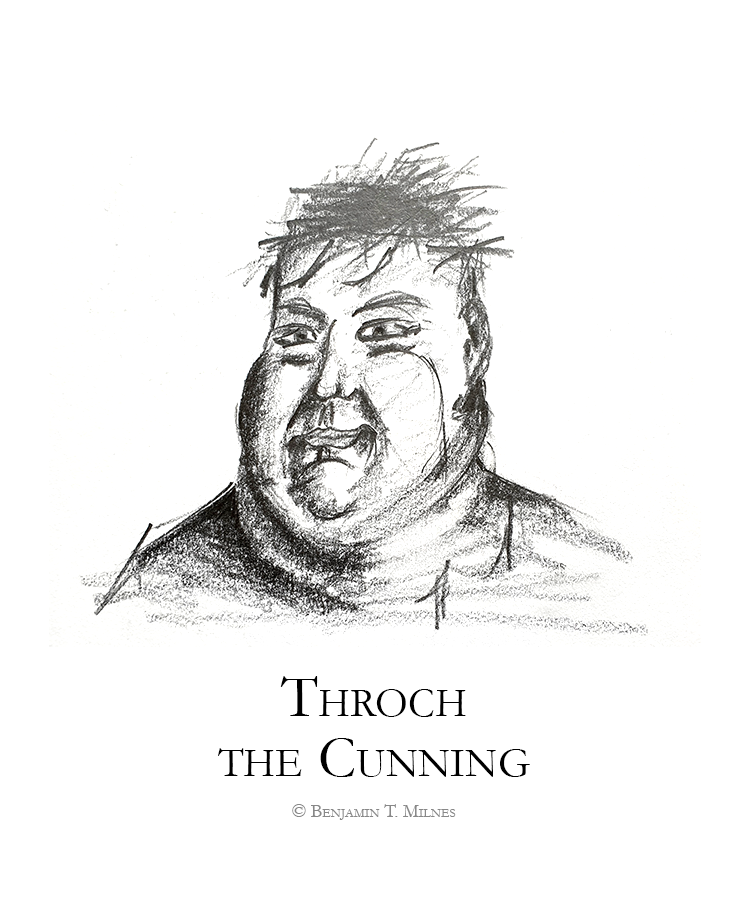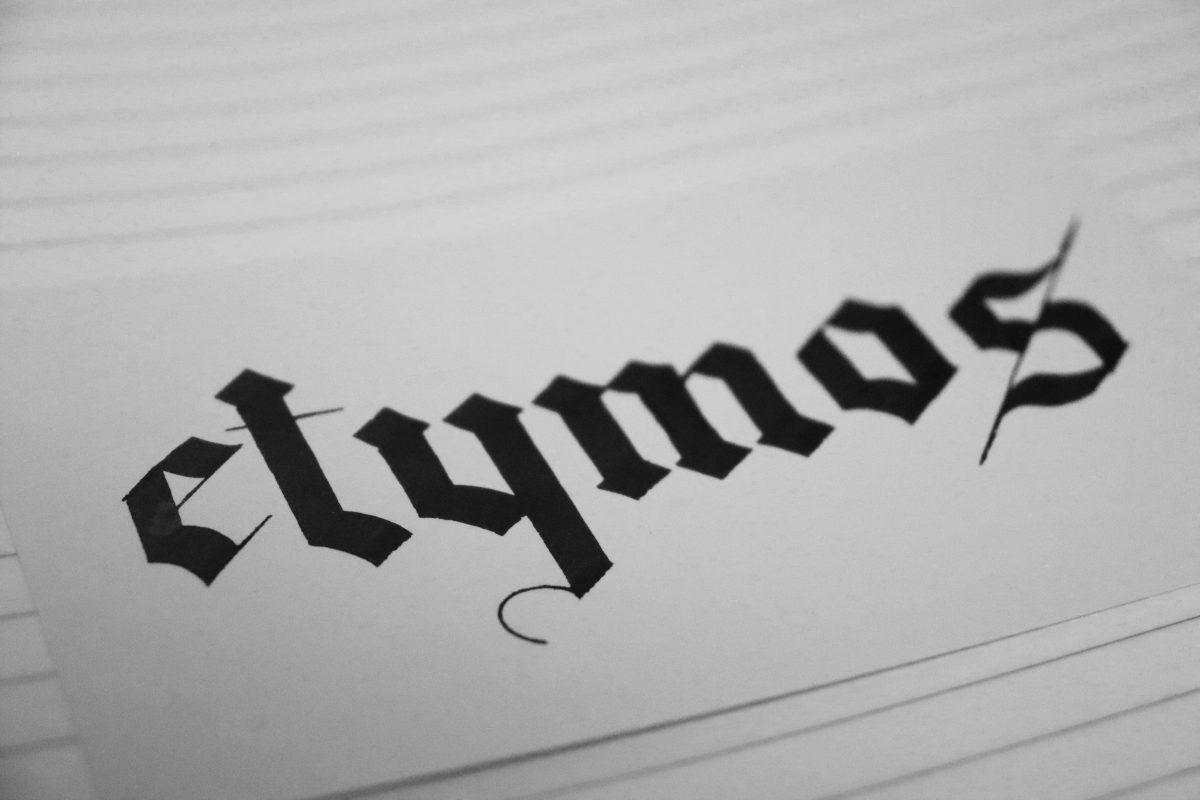written by me, Benjamin T. Milnes, based on The Emperor’s New Clothes by Hans Christian Andersen
The Emperor had an enormous penis.
That’s what he said, at least. Only the Empress and the Emperor’s concubines – all eighty-eight of them – had ever actually seen it, and they dutifully repeated the Emperor’s own claims about it. And the Emperor himself repeated his claims every chance he had – he would shout it from the walls of his palace – sometimes three, four, five times in a day. He claimed that it was twenty-four and a half inches long – longer than that of any emperor ever before – longer than that of anyone else in the world. He claimed that it was so great in girth, that he could not grasp it even with both of his hands.
Mind you, his hands were very small – that everyone could see – small and fat. Indeed, many questioned, if his hands were so small, surely his penis must be small too? The only thing that wasn’t small about the Emperor was his waist. The Emperor was fat and old, with a face like a pouting pig.
You might think that no-one would believe such unbelievable claims about the size of the Emperor’s penis, but some people did! I’d say at least three out of every ten people believed it – it was even more when the Emperor had first ascended to the throne. Those who believed it were, unsurprisingly, the Emperor’s supporters – those who liked the Emperor’s policies (or at least, who liked the idea of the Emperor’s policies – once implemented, those policies actually cost the Emperor’s supporters).
But no-one else believed it. It was so obvious that he would want to boast about something like that. The Emperor was petty, petulant, and pompous in all that he did. And if it was true, it wasn’t difficult to prove! ‘Show us the penis!’ the Emperor’s opponents said.
Those who did not believe the Emperor’s phallic claims were baffled by those who did. It was so obvious that the Emperor was making it up. But the Emperor’s supporters were insistent. Like the Emperor himself, they too claimed that it was the size of his penis that gave him his divine right to rule as Emperor; it was the size of his majesty’s wang that had brought great wealth to the empire over the last few years; and lesser kings of vassal states obeyed the wishes of the Emperor because they were in awe of the size of his imperial schlong.
The great city where the Emperor resided was always bustling. People from all over the world came to the city. One day, two swindlers came to the city, and they had a cunning plan to get a lot of money. They told everyone they met that they were the greatest weavers in the world, and that they could make the finest silk brocades and damasks using colours beyond all imagination: bluish copper, fuchsia gold, emerald-orange, and topaz-white. Not only that, but they said that the fabric they made possessed magical qualities: the cloth would be invisible to anyone who was not loyal to the Emperor, or to any man whose penis was indefensibly small.
‘What a brilliant material!’ the Emperor thought when he heard of the master weavers’ claims. ‘If I wore a suit made of this material, I would be able to tell who in my empire – including those in my own government – are not loyal to me. I must have this fabric woven for me at once.’ So the Emperor gave the swindlers a great sum of money for a bolt of this material.
The swindlers got to work right away – at least, they pretended to. They set up two looms, and pretended to be hard at work at them. They moved their hands as though to send the shuttle back and forth, and moved their feet as though pushing down on the treadles, but in reality there were no threads in the looms, and they produced no fabric at all.
‘I want to know how much progress they’ve made on the fabric.’ the Emperor thought after a few days had passed, so he sent one of his ministers to where the swindlers worked to inspect the cloth.
I will say at this point that almost no-one in the Emperor’s government liked the Emperor. The Emperor was petty, changeable, and above all stupid. The Emperor had no idea how to rule his empire, and it was all his ministers could do to prevent the Emperor from implementing policies that would see the end of the empire’s prosperity. The Emperor was an annoyance – one that his ministers could do without. Most were not loyal to him, and a number of them were plotting to remove the Emperor, and place someone more competent on the throne.
The minister that the Emperor sent to inspect the fabric was one such person. When the minister walked into the room where the swindlers sat at their looms, the minister could see no fabric. ‘It is because I am not loyal to the Emperor.’ the minister thought. Not for a second did the minister wonder if he had a small penis, because he, like the Emperor, was quite convinced of the massiveness of his dong. ‘I must pretend that I can see the cloth, otherwise these master weavers may tell the Emperor that I cannot see it, and he will discover our plan to overthrow him.’
The swindlers requested that the minister come closer to the looms, so that he might see the intricate patterns they had woven into the fabric. They asked if he admired the way the fabric shimmered in the light, and the way the colour changed as you moved around the room, all the while pointing at empty looms.
‘The fabric is most exquisite.’ the minister said. ‘The colours are so vivid, and the patterns are so beautiful. I shall tell the Emperor that the fabric is of extraordinary quality, and that you are making excellent progress.’
‘We are glad to hear that.’ the swindlers said, and the minister returned to the palace to tell the Emperor what he had seen.
Now the swindlers asked the Emperor for more silk thread, so that they might continue their work. The Emperor eagerly gave it to them, but they did not use any of it. They kept it, so that they could sell it later, once they’d left the city. And they continued to work at the empty looms.
After another few days had passed, the Emperor sent a second minister to the weavers, to see how they were getting on. Like the first minister, this second minister was also planning to depose the Emperor, and was also assured of the vastness of his pisser. But this second minister was older than the first; he had been part of the government for decades. He was more astute, and more sceptical of the claims of these weavers.
When the older minister walked into the room where the weavers sat at their looms, he too saw nothing, but he was not fooled by the swindlers. ‘There is no fabric.’ the older minister thought. ‘They are trying to deceive the Emperor.’ But the minister, having no loyalty to the Emperor, saw no reason to tell the Emperor of this deception – the minister would gain nothing by doing so. ‘I must pretend that I can see the fabric, otherwise these swindlers may tell the Emperor that I cannot see it, and he will believe that this means I am disloyal, and he will discover our plan to overthrow him.’
‘Is it not a beautiful fabric?’ the two swindlers asked, lifting up the non-existent fabric and showing it to the minister.
‘The fabric is most exquisite.’ the older minister said. ‘The colours are so vivid, and the patterns are so beautiful. I shall tell the Emperor that the fabric is of extraordinary quality, and that you are making excellent progress.’
‘We are glad to hear that.’ the swindlers said. The older minister returned to the palace, and told the Emperor what he wanted to hear.
Everyone in the whole city was talking about the magnificent fabric, but they did not all say the same things. Those who were opponents of the Emperor were not fooled by the swindlers. They did not believe that this fabric had magical qualities – let alone such conveniently specific qualities as identifying who among the population was not loyal to the Emperor, and who had a small penis.
Those who supported the Emperor thought quite differently. They believed the swindlers, and saw this fabric as an opportunity. If the Emperor wore a suit made of this fabric, they would know, for certain, who opposed the Emperor, and they could see that those people were less vocal about their opposition in future.
At last the Emperor wished to see the fabric for himself, so he went to the room where the two swindlers sat at empty looms, surrounded by (what he thought were) eighteen of his most loyal ministers.
‘See, your majesty.’ one of the two swindlers said, pointing at the loom. ‘Are not the colours so vivid? Is not the pattern so intricate?’
The Emperor stared, open-mouthed, at the loom. He slowly realised that he could not see anything on it, but he did not understand – the fabric was only supposed to be invisible to men who had small penises – and he was quite convinced that his whacker was sufficiently whopping to be able to see the fabric – and the only other explanation was that he was not loyal to the Emperor – but he was the Emperor – how could he not be loyal to himself?
The Emperor asked the two master weavers about this. ‘It is because you are the Emperor, your majesty.’ the master weavers said. ‘Can one be loyal to oneself? It is a meaningless question, thus the fabric will be invisible to you.’
The ministers who stood around the Emperor – most of whom knew that there was no fabric – were amazed that the swindlers were able to get away with such a ludicrous reason, but they were glad that they did. The Emperor turned to his ministers and said ‘What do you think of the colours? What do you think of the pattern?’, pointing at the empty looms.
‘The colours are most vivid, your majesty, and the pattern is most intricate.’ the Emperor’s ministers chorused. None of them could see the fabric, for there was nothing to see, but none wanted the Emperor to see that they were disloyal, so they played along with the swindlers.
The Emperor turned back to the master weavers. ‘Your fabric has my approval. I shall make you the Imperial Court Weavers. You must make a suit for me out of this fabric, and I shall wear it in a great procession through the city.’
The swindlers agreed to do so, and they stayed up long into the night, pretending to lift the fabric, cut it, and sew it together into a suit. Many people looked in through the windows to watch the master weavers work. When morning came, the swindlers set down their scissors and needles and at last said
‘The Emperor’s new suit is ready now.’
The swindlers walked to the imperial palace, pretending to carry the suit with them. They went into a hall where the Emperor waited, surrounded by all his ministers. The swindlers held up their arms as though they were holding something in their hands and said ‘Here, your majesty, these are the trousers! This is the coat! This is the cloak! They are as light as air, and when you wear them, it will feel as though you are wearing nothing at all, but that is just another of the fabric’s magical qualities.’
The Emperor turned to his ministers. ‘What do you think? Is it not the most beautiful suit in the world? Do I not have the most brilliant taste in clothing?’
‘Yes, your majesty.’ the Emperor’s ministers said, though none of them could see anything, as there was nothing to be seen. ‘No Emperor before has ever had such fine taste as you.’
‘Let us assist you in putting on the new suit, your majesty.’ the swindlers said, and they went to the Emperor’s dressing room with the Emperor.
Meanwhile, the Emperor’s ministers made preparations for the great procession. Guards stood along either side of the wide street that the Emperor would walk along; trumpet players stood on the steps that led up to the entrance to the imperial palace, ready to play a fanfare for the Emperor when he walked out. The bearers of the canopy waited outside the great doors to the palace, and the people of the city pushed against each other as they tried to get a place at the front of the crowd along the sides of the street.
‘I am ready.’ the Emperor said, standing behind the doors to the imperial palace. ‘Does not my suit fit me marvellously?’ the Emperor asked the master weavers.
‘Most excellently.’ they said, and they left the Emperor, exiting the palace quickly, with a plan to leave the city as soon as possible, with all of the money and silk they had received from the Emperor. ‘That was even easier than the last Emperor.’ one swindler said to the other.
Outside the doors to the palace, the fanfare played. The doors swung open, and the Emperor strode forward, in full view of all of the people of the city. They gasped in shock.
The Emperor, of course, appeared to be wearing nothing at all, because he was wearing nothing at all. Whether a person believed that the Emperor was wearing something or not did not matter – none of them could see any clothes … but they saw something else instead …
The Emperor had a small penis.
… I mean, it wasn’t just small – it was practically microscopic. None of the people who lined the street had ever seen such a small penis in their lives – they didn’t even think it was possible for someone to have such a small penis. It was like a grape and two raisins … … an almond and two walnuts … … a lentil and two peas … … a grain of barley and two grains of r- you get the idea.
The Emperor had been lying for years, though of course his opponents had always suspected it. Those among the crowd who opposed the Emperor at this moment burst out into laughter at the Emperor’s tiny tool.
The Emperor’s supporters did not. They glowered at the Emperor’s opponents.
‘The Emperor has a small penis!’ his opponents called out. ‘He has been lying to us for years!’
‘No he doesn’t.’ his supporters responded. ‘The only way you could see his penis is if you are not loyal to the Emperor, or if you yourself had small penises – if either is true, your opinion is worthless.’
‘But don’t you see?!’ said the Emperor’s opponents. ‘He’s not wearing any clothes! There never were any clothes! There never was any magical fabric!’
The Emperor’s supporters refused to consider the possibility. ‘He is wearing a magnificent suit!’ they said. They knew that they could not see the suit, but they also knew that they were loyal to the Emperor, which meant that they must have small penises. They did not want to admit such a thing, so instead they pretended to see it. ‘We can see the suit. Therefore we must all be loyal to the Emperor, and we must all have big penises. It is all of you who must have small penises!’
But the Emperor’s supporters did not realise – the Emperor’s opponents all knew that the Emperor’s supporters could in fact see the Emperor’s yoctoscopic yoghurt-slinger, but since they also knew that the Emperor’s supporters were all loyal to the Emperor, they knew that the only reason why they would not admit that they could see the Emperor’s petite pink oboe was because they feared it would suggest that they had small penises.
‘It does not matter whether you think there is a suit there or not.’ the Emperor’s supporters said. ‘You can see that the Emperor has a small penis! You KNOW that he has been lying to us!’
But the Emperor’s supporters did not believe it.
I wish I could tell you what happened next in the story … but I do not know. Did fighting break out between the Emperor’s supporters and opponents. Did the Emperor command his guards to seize all of those who said they could not see the suit as traitors? Did the Emperor realise that in fact he had been fooled, and that he wasn’t wearing any clothes? Did the Emperor’s ministers ever succeed in their plot to overthrow the Emperor? I don’t know. I don’t know how this situation could be resolved. How do you convince people to change their minds, when they will deny the obvious and inescapable truth before them, that the Emperor has a small penis?
